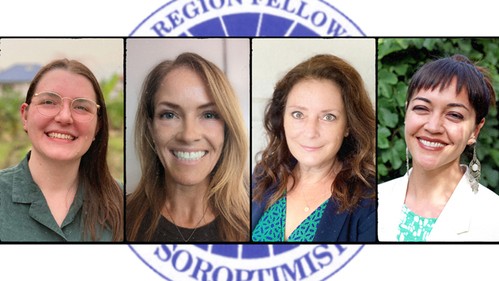October 30th, 2023

For the fourth consecutive year, women doctoral candidates from the University of Hawaiʻi at Mānoa earned grants recognizing their studies, research and work, all of which have great social importance to the world.
Nearly half of the 2023 Founder Region Fellowship grants from Soroptimist Founder Region Fellowship, Inc. were awarded to UH Mānoa students. Erin McConkey, Joanne Qinaʻau, Randi Rollins and Amy Var each received a $10,000 unrestricted grant to support the completion of their degrees.
“I had the privilege of attending the Soroptimist Conference, an unforgettable and enriching experience,” Rollins, from the School of Life Sciences, said. “We connected with all the remarkable awardees and personally met the generous sponsors to express our gratitude. The grant not only enabled me to reduce my hours at a part-time job but also afforded me the precious time needed to focus on completing my dissertation. Furthermore, it facilitated my participation in a statistical training in Seattle. These opportunities have been pivotal in nurturing my professional growth, guiding me towards the next step in my career.”
In honor of the Founder Region Fellowship’s 75th anniversary, a celebration was held in Oakland, California, where awardees were recognized for their doctoral work and contributions. Since 1948, 363 grants totaling more than $1.7 million have been awarded. Some of the fields awarded over the years include: clinical psychology, endocrinology, sociology, genetics, immunology, zoology, marine biology, civil engineering, bioengineering, infectious diseases, agricultural policy reform, law, social science and special education.
“I couldn’t be more grateful! The buffer fellowships like this allows for more time and energy to be spent on our research—hopefully this means an even higher quality of work,” Qinaʻau said. “Additionally, the fellowship has contributed to less worry and stress over how to pay bills during a year where dissertation demands are high. Mahalo nui loa to everyone involved who made this happen!”
UH Mānoa’s 2023 awardees
Nearly half of the 2023 Founder Region Fellowship grants from Soroptimist Founder Region Fellowship, Inc. were awarded to UH Mānoa students. Erin McConkey, Joanne Qinaʻau, Randi Rollins and Amy Var each received a $10,000 unrestricted grant to support the completion of their degrees.
“I had the privilege of attending the Soroptimist Conference, an unforgettable and enriching experience,” Rollins, from the School of Life Sciences, said. “We connected with all the remarkable awardees and personally met the generous sponsors to express our gratitude. The grant not only enabled me to reduce my hours at a part-time job but also afforded me the precious time needed to focus on completing my dissertation. Furthermore, it facilitated my participation in a statistical training in Seattle. These opportunities have been pivotal in nurturing my professional growth, guiding me towards the next step in my career.”
In honor of the Founder Region Fellowship’s 75th anniversary, a celebration was held in Oakland, California, where awardees were recognized for their doctoral work and contributions. Since 1948, 363 grants totaling more than $1.7 million have been awarded. Some of the fields awarded over the years include: clinical psychology, endocrinology, sociology, genetics, immunology, zoology, marine biology, civil engineering, bioengineering, infectious diseases, agricultural policy reform, law, social science and special education.
“I couldn’t be more grateful! The buffer fellowships like this allows for more time and energy to be spent on our research—hopefully this means an even higher quality of work,” Qinaʻau said. “Additionally, the fellowship has contributed to less worry and stress over how to pay bills during a year where dissertation demands are high. Mahalo nui loa to everyone involved who made this happen!”
UH Mānoa’s 2023 awardees
- Erin McConkey is an anthropology student in the College of Social Sciences. McConkey’s dissertation explores the sociomaterial entanglements surrounding the production and use of snake antivenom in Thailand. It critically examines how human and nonhuman relationships transform medico-scientific ideas about the body, medicine and labor. McConkey hopes her work will bring to light avenues for reducing the number of snakebites and improving access to safe and effective treatment.
- Joanne Qinaʻau studies psychology in the College of Social Sciences. Qinaʻau’s dissertation is an offering to ancestors, outlining detriments, supports, states and outcomes of wellbeing for Native Hawaiians who have behavioral health challenges. Highlighting the stress of settler colonialism and the need for ecological pono (morality, righteous, just) and relational pilina (relationships), their work aims to inform intervention design. Preliminary measures can also be adapted for therapeutic or research purposes, while the empowerment materials contribute to kaiāulu using a participatory approach.
- Randi Rollins is a zoology student in the School of Life Sciences. Rollins’ research focused on the ecology of rat lungworm. Parasitic nematodes infect 1.5–3.5 billion people worldwide. Human infection is closely associated with economic status and disproportionately affects economically disadvantaged people, especially in tropical/subtropical and developing countries. Having graduated in August, Rollins started a postdoctoral position at UH on a National Institutes of Health-funded project to discover treatments/preventative compounds for rat lungworm disease.
- Amy Var is a learning design and technology student in the College of Education. Var’s dissertation study: Examining Technology Integrated Higher-Order Thinking Practices at Title I Public Middle Schools aims to better understand how teachers use technology to promote higher-order thinking in disadvantaged settings where the literature suggests such practices are lacking and, in doing so, shine a light on innovative, exemplary practices, thereby promoting social justice through digital equity.
Recent
Archive
2024
September
October
November
2023
September
October
November
2022
July
November
December
Categories
no categories
Tags
no tags
No Comments